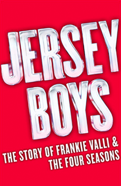Marshall Brickman: Finding The Four Seasons
About the author:
After decades of success in Hollywood, including a 1978 Academy Award for collaborating with Woody Allen on the original screenplay of Annie Hall, Marshall Brickman found instant success on Broadway—including a Best Book Tony Award nomination—as co-author of the book for the megahit musical Jersey Boys. Here, Brickman confesses how a newfound passion for The Four Seasons coupled with the collaborative nature of theater helped him put the story of that crooning quartet from the Garden State on the Great White Way.
![]()
For me, it's always been about the music. Music pulled me like a gravitational force. I entered college as a physics major but left as a Bachelor of Music, a degree with the same practical application as, say, one in the History of Chinese Poetry. After college, rather than pursue real work, I joined a folk group and sang in coffee houses and nightclubs, an occupation that does little for the intellect and even less for the complexion. Early in 2004, after a several-decade digression during which my true calling was interrupted by television and film, my future co-author handed me a CD of The Four Seasons and said, "Just listen."
It was like discovering a great author you never knew existed. As deejay Barry Belson says in the show, I thought, "Who are these guys?" Doo-wop? R&R? R&B? Not exactly. Is that a harp? An oboe? Chimes? An African hair-drum? A string quartet? In a Top-40 record? And that guy with the three-and-a-half octave range with no break in the falsetto—what gives here?
Of course, it's impossible to have lived in America in the 20th century and remain unaware of The Four Seasons. But when you start really listening to their stuff—as I did—you start to appreciate the originality, audacity and invention in the music. I came to realize that to be an artist you didn't have to wear a beret or a powdered wig or write with a feather. I was hooked.
The same theater-savvy friend also cautioned me that the operative phrase in musical theater was "negotiation by tantrum." Happily, Jersey Boys proved an exception to the rule and indeed provided me with endless pleasures watching our four leads recreate The Four Seasons with uncanny accuracy and almost spooky authenticity. The audience's nightly involvement with the story is always a surprise to me, as I am congenitally incapable of suspending disbelief. But most of all, the music—those songs which, like great folk art, remain embedded in the common consciousness and which have become part of the soundtrack of the American experience.
Related Shows
Articles Trending Now
- Death Becomes Her, Maybe Happy Ending, Oh, Mary! and More Earn Nominations for the 2025 Broadway.com Audience Choice Awards
- Carrie St. Louis, Katie Rose Clarke and Quinn Titcomb to Star as Dolly Parton in World Premiere of Dolly: An Original Musical
- Tituss Burgess to Return to Oh, Mary! as Show Extends
